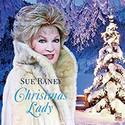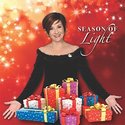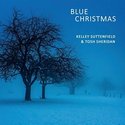Past Reviews Sound Advice Reviews
Discs and Downloads for December's Happy Holidays |
|||||
|
It's that time again and there's certainly no need for a "Silent Night" because, once again this year, there's plenty of holiday music out there. Whether you choose to have a good old-fashioned Christmas with albums or holiday-related singles, there are songs old and new. Some of those have drifted our way in a flurry like a little snow squall.
For musical theatre-focused fans at holiday time (or Christmas music-focused fans out for something theatrically charged), each year's release of new recordings in the Carols for a Cure series has become, as Tevye and the Fiddler on the Roof characters would say, tradition! While this year the celebration of Hanukkah's eight nights is dwarfed by 21 other tracks that almost all look at the season with Christmas center stage, the Fiddler revival cast is an appropriate, expected exception. It's also a highlight, the light of a menorah shining brightly with "Nerotai Hazerim," which translates as "My Little Candles." The participants include Alix Korey (Yente the Matchmaker), nine more company members chiming in, and even—of course—a fiddler, presumably not recorded on a roof, as that may be reserved for parking for reindeer-led sleighs. It's a nice souvenir of the revival slated to close on New Year's Eve. And the two-disc set ends with year-ending reflection we all hear or sing (perhaps a bit drunkenly off-pitch) on that night ... Well, sort of. Ears perk up with the neat trick of resetting the famous words of "Auld Lang Syne" to an engaging new melody by Deborah Abramson for the Matilda merrymakers. The performance on this record sets a record of its own, with nineteen young girls who've played the title role among that big chorale! These eighteen years of recordings for charities associated with the theatre union's fundraising efforts, Equity Fights AIDS, are always a mixed bag, in the best sense of mixed bags, like Santa with a good haul of gifts. In addition to a handful of specially created, show-specific clever inventions (like the Cats revival cast reviving and expanding "Jingle Bells" into "A Jellicle Christmas"—new words by Cats cast member Richard Todd Adams) among the time-tested traditional carols (thus the series title, Carols for a Cure). Several other yuletide tunes make cameo appearances, too, refitted for felines ("We Three Kings of Orient Are" becomes a quick tale of three cats looking for an open door, etc.). Oddly, as if apologetically meowing, "But seriously now ...", kitten-kidding suddenly stops and the plucky and playful track gets a highjack for an earnestly religious P.S. A totally straight "O Holy Night," words unchanged, makes a lengthy appearance to end this effort, a solo by the revival's opening-cast Grizabella, Leona Lewis. Rarely is anything bland or sounding like background music; energy and vitality reign. And glorious harmonies are a reliable specialty. While this year's treatment of "Away in a Manger" may start off unremarkably plain, it heats up as the arrangement and performances by seven performers who oft toil as understudies—representing the concert series for such folks, At This Performance ...—build with increasingly complex crescendos. And allowing us a sense of discovery beyond the show's usual suspects in the spotlight, in this yearly yuletide fete accompli, we listeners often feel a sense of discovery, with the more prominent participation of some established productions' understudies, alternates, replacements, and ensemble members. In the case of Cagney, we get the guy who plays the title character and is the original driving force/co-writer, Robert Creighton, crooning and kibitzing, but it's the songwriter and song we happily discover. It's the late Bob Lorimer's creation, the site-specific/sights-specific affectionate ode to "Christmas in New York," bathing the town in its most flattering light, but allowing for a little hometown brio and Brooklynese. While this year's crop brings none of the truly outrageous or silly comedy, sung or spoken, that sometimes brings respite from the reverence and grand-scale floods of vocals, there is secular cheer and fun among the effectively awestruck paeans to the birth of the saviour. For me, not all of these are gorgeously glorious or satisfyingly striking in chances taken for new cloaks, achieving more in pure volume and borderline cacophony than refreshingly valid variety as alternate approaches: The Aladdin group's "Angels We Have Heard on High" feels almost desperately rambunctious with prominently thudding percussion and shouts of "Hey!" And, despite the efforts of a long-running show's 2016 company having its Wicked way, piling on much sound and many voices and language switching, the ancient "Silent Night" (originally written in German) would likely be better off with simplicity and a little more sense of, um, hushed silence after all. Some items surely have the flavor of their shows, characters, or songwriters that's as instantly recognizable as the taste of a peppermint candy cane. The bio-jukebox musical Jersey Boys is represented with two selections nicely echoing its era and distinctive period stylings. "This Time of Year" is led by Mauricio Pérez, one of those who's played—and thus has the distinctive stratospheric voice sound for the task—real-life singer Frankie Valli (who, by the way, put out his own Christmas album this year at age 82). Pérez gets a chance to interpolate a bit of the Four Seasons' hit "Sherry" with a seasonal wish (Hint: What two-word season's greeting starts with a word that rhymes with that hit's title?) As listed here, the show's touring production got another coveted slot, with a solo original number; put an asterisk there because the singer (and co-writer) of the cute novelty "Stowin' Away" (in Santa's Sleigh)" moved on to the Broadway cast in September. Two of this season's productions nicely and respectfully honor their pop female tunesmiths' past holiday-themed output, as On Your Feet! takes on "Christmas in Your Eyes" by its biographical subject, Gloria Estefan (co-written with Diane Warren) and, led by its leading lady Jessie Mueller, Waitress's songwriter Sara Bareilles's "Love Is Christmas" is well served. And what would a look at the world of today's Broadway be without Hamilton? I'm impressed with the vitality and charismatic lead vocal performance of Anthony Ramos, who plays abolitionist John Laurens in the smasheroo. He's also the lyricist and co-composer of the song—with Kurt Crowley, on keyboards here and co-arranger/co-orchestrator with drummer Benny Reiner. The title, "I Can See the Light," may be repeated too often in the lyric as performed here, but the sincerity and commitment compensate as do the wonderfully varied shadings and tempi.
Good things come to those who wait. As a Christmas music fan, I'm someone who's been known to say that, despite the annual avalanches piling up as high as an elephant's eye (or reindeer's), you can never have too many Christmas albums. Well, there's a caveat or two. Nostalgia and singers' lifelong desire to sing the numbers that have been part of their own life-long Christmas soundtracks are powerful forces and the end result is lots and lots and lots of holiday albums with the same old, same old short list of "everybody's favorites." The tried and true can become the tired and truly redundant sometimes. But don't worry much this time. It's interesting when a singer who's been around for decades and made many albums quite belatedly ventures into the musical snow and finally gets around to a first holiday album, bringing years of savvy musical perspective. Sue Raney has been one of my true favorites going back to the time when I only had a few favorites and little more than one shelf of vinyl. She began recording as a teenager in 1959, and brings her still-unaffected charms to the season. On her baker's dozen of delicious renditions, she eschews the religious part of Christmas until the final track, "Silent Night." It's so moving and sincere and spot on that it made me end my first of many listens with the Christmas wish that there had been more in that vein. Instead, the album is stuffed like a sweet fruitcake with sugary confections, but—fortunately—Miss Raney reigns as one of the surviving gently jazz-oriented stylists who can cook with honey and make it work. The performances make you believe that she believes in every single secular sight of the season—such as "frosted windowpanes, candles gleaming inside, painted candy canes on the tree," to quote Sammy Cahn in the included "A Christmas Waltz," daringly taking Jule Styne's melody unusually slower, without losing the joy of what's typically a romp. One gets the feeling that she wants to savor each visual pleasure, ready to click a pic with her cell phone camera before letting the merry-go-round proceed to the next stop. Same holds true for those crisp images in the familiar descriptions that make up much of "Silver Bells" and "White Christmas." The latter is accompanied strikingly by veteran harpist Gayle Levant, which definitely also tugs at the heartstrings oh-so disarmingly. All other tracks were arranged by the sessions' pianist Tom Ranier, and Raney and Ranier make an ideal team, with eight other musicians, including flugelhorn player/production supervisor Carmen Fanzone, whose work can be heard on several of the singer's albums, who passed away several weeks after these June recording dates, and to whose memory the project is dedicated. And, though she doesn't sing "It's Beginning to Look a Lot Like Christmas," your mind will register exactly that—and the litmus test is passed, making "A Marshmallow World" a world we'd not shudder to visit, let alone stay in. Like the puffy treat in the title which is being compared, of course, to the soft snow-covered lands, one often chokes on the goo-heavy fluff with this smiley simplistic song. Sue, I surrender! Christmas Lady opens with the title song, an old-ish yet unfamiliar one, which was written to honor and describe the wife of its author, musician Dick Shreve ("She's busy making dreams come true for everyone to share"). This Christmas lady comes off as just as magical and loving, her secure, pitch-perfect, clean voice with its excellent enunciation gracing line after line of lyric and melody on every single track. Though it's clear she doesn't want any of that marshmallowy mush or requite drifts for a white Christmas, this true pro of a vocalist with a heart of gold and tones the same could melt the heart of many a confirmed curmudgeonly Scrooge, I daresay. This joy-spreader decidedly has a smile in her voice. I'll admit that it seems out of place and out-of-character casually calm for a lyric lingering on the longing to be with an absent loved one when it comes to one long-distance wish, "Merry Christmas, Darling." A Carpenters hit most first heard at some point in the 1970s (though Richard Carpenter's musical setting was done in 1966 and the orphan lyric was already two decades old) could have been the change-of-pace weeper in the happy lot. Arguably, someone who's lived and loved and learned might have a better perspective about time and what in youth would seem like a crippling tragedy of not being together for a holiday. With the other words acknowledging joy and coziness of a yuletide fire and well-lit tree, perhaps Sue Raney sings this as someone seeing the glass of egg nog half full. The classy musicians who show both sentiment and restraint are key factors in keeping it real. While it's surely grand fun to include a buoyant, albeit brief "We Need a Little Christmas" from Mame, the two most reflective and adult selections are the caviar amidst the candy. Maturity and serenity radiate through these skillfully but naturally phrased, elegant treatments. One is "A Christmas Love Song," with a handsome melody by Johnny Mandel and a typically heartfelt romantic Marilyn and Alan Bergman lyric—the one that states, lovingly, "All I want for Christmas is you." (Sue Raney is especially strong with the works of these writers, as evidenced by a past album dedicated to Mandel's compositions and another surveying the output of the married wordsmiths.) The other lovely gem is "Christmastime Is Here." These two—the second one from the animated perennial where Charlie Brown and the "Peanuts" characters experience the holiday—are the balm we need every year as antidote to the noisy and busy recordings that fill the air. Less is more and these make us want more Raney rhapsodies. Indeed all is calm, all is bright. And all is right with the marshmallow world. Thank you, Christmas Lady.
Although her voice sounds bright and youthful, Megon McDonough is no new kid on the musical block. She's been recording for a few decades already. Long steeped in folk music, she has an unmannered purer sound and an unfettered style that cut to the chase. I came across her somewhat belatedly, in her associations with Christine Lavin and other female folkies, forces combined—tongue-in-cheekily—as "Four Bitchin' Babes" on some CD group efforts. Humor and heart were both there, along with a down-to-earthiness and a tone that can be pretty but not pallid. So, naturally, the next step was picking up her solo recordings. I am delighted to see that she's put out five tracks for Christmas. Four of the selections are well-known, well-loved, well-covered Christmas songs. But, wait—before you run for the snow-covered hills in flight from yet one more round-up of the classics we've heard over and over, these are well worth the listen. The reason is simple: She keeps it simple. While many think that the best or only way to refresh or reinvent the warhorses is to dress them up with lots of glitter or gusto or gimmicks, for the sake of being different at any cost, the McDonough way is not that. I can safely presume that she knows that these songs last for generations because they have a basic core that must and can be reached. Or should I say heart. Just as a Christmas tree's branches can sag from the weight of too many decorative touches, overdoing the garlands, tinsel, and baubles, a simple Christmas wish in a well-crafted song can collapse if overly decorated, distracting from its basic gem-like essence. If you've overdosed on the overdone (sleigh)bells and whistles and layers of other instruments, especially the synthesizer ones, with background vocalists who can often be insipid or competing, just you wait. Watch what happens when the dressing and wrapping are stripped away and someone gets to the beating heart of the matter. Megon McDonough succeeds in spades. Is it that simple? Well, it's simply startling. The one religious choice is "Away in a Manger," tender and timeless in its appropriately awed observation of the baby Jesus. It's no easy feat to make a story about an ancient, oft-related event sound so in the moment. But her acting and commitment bring us there. For accompaniment, guitar graces the pensive observation, making it all genuinely sweet and reverent in an understated way. A sprightly, easy-breezy "Let It Snow! Let It Snow! Let It Snow!" so suavely avoids the hyperactive glee or smarminess some unwisely bring to it feels likably effortless. I'm almost reluctant to use those three exclamation points in the title as it was published. And Peter Polzak's piano, especially his nifty solo, bring us all happily into Jazzland. He is simpatico with Megon's sensitive and wistful, non-schmaltzy phrasing on Hugh Martin's classic "Have Yourself a Merry Little Christmas." There's some effective personalization in this treatment, with a few little liberties taken, and a decidedly strong sidestep away from any soap opera. It's pretty real-feel, but maybe no need for the larger size box of tissues to wipe tears. "Christmas Time Is Here" is placid and delivers the needed appreciation. It is the vocalist's self-written "Season of Hope" which is the most affecting and effective. Laying out the potential, priorities, and perspectives that are presented to us as the many possibilities to embrace, it's a "list song" with a message. Giving title to the five-song EP, "Season of Hope" was penned to be a wish for healing, in response to the tragic school shooting in Maryland in 2012. There are no specific references to that or any tragedy, so the dignified and emotional work becomes quite universal and indeed beams hope, with references to the rhyming "season of birth" and "peace on earth" making it a fit for this particular season. There's a refreshing candidness and genuineness on these Megon McDonough selections for the holiday—there are no plastic Christmas trees or fake smiles or fake tears in her musical world.
Millions of folks just were introduced to Madelyn (Maddie) Baillio when she starred as Tracy in the nationally broadcast Hairspray Live! earlier this month. Welcome to the fan club. I had a head-start, having caught her when she competed in the Great American Songbook Initiative created and hosted by Michael Feinstein a few years ago. She won. She has two singles on the market this year, both penned by Larry Kerchner, the other being "Can't Stay Away from You." (Coincidentally, he has a notable history with another musical recently remade for TV, being the ghostwriter of some of the score of The Wiz.) Maddie has an open, joyful sound. Singing sounds like it's natural and fun for her and she makes songs fun to hear as the happiness transmits. "Christmas Day!" is a lively and zippy piece, an opportunity for the blitheness to come out. It swings effortlessly and Maddie swings along. Without coming off as coy or trying to sound like a "kid," the performer, now 20, unaffectedly sings about hanging out beside that jolly gent in the red suit: "I'll be right here next to Santa Claus on Christmas Day." Musical chameleon Kerchner can tailor material to sound specific to an era or style with panache in his pastiche or defy categorization by sounding up-to-date, but not self-consciously derivative of a specific act or writer. From what I've heard, Maddie Baillio doesn't sound locked into a sound or approach that could soon seem dated; to borrow a title from Hairspray, she sounds "Timeless to Me."
At Christmastime, "My Gentile friends are all having a ball," jealously laments the Jewish guy not on Santa's radar for gift deliveries. He wishes he could have some of the Christmas stuff—just the things seems so much fun ("We want your Rudolph"), but not all of it ("Keep your fruitcake"). Or maybe some acceptable combinations to enjoy "A Jewish Christmas." "We don't do 'Ave Maria,' but with some tweaking, we could sing it in Judea," he posits, reimagining the prayer as "Oi Vey Mariah." And so it goes, "knish" rhyming with "gefilte fish" and wordplay like "We put the 'Jew' in 'jubilation'." It's a brash, winking number, hammy in the most kosher way possible. And it finds its more than game interpreter in the uber-energized popular cabaret singer (and pianist) Mark Nadler, whom I've witnessed get lots of LOL reactions performing this piece live in venues in Manhattan. (He's doing two different shows with once-regular partner KT Sullivan at the Laurie Beechman Theatre on West 42nd Street's Theatre Row: a holiday concert and an extension of their successful act of songs with lyrics by Alan Jay Lerner.) In the gearshift marked "nutty," Nadler corners the market on over-the-top cabaret comic capers. His timing is sharp, and the broad "A Jewish Christmas," full of Yiddish expressions and affectionately invoked ethnic stereotypes is ready-made for the talents of this ultra-high-energy whirling dervish (or shall we say, spinning dreidel of a song-and-dance man?). "A Jewish Christmas" has become a fan favorite at his shows and revues of material by its versatile composer-lyricist-arranger Larry Kerchner.
Songwriter Larry Kerchner, who usually leaves the singing to others, has recorded one of his own comedy songs. "Hanukkah Shmanukkah" is a cheeky bit of kvetching from a sassy, eye-rolling 13-year-old who has had enough of the holiday, the traditional foods, the family reunions, etc. In the rollicking number, he makes fun of it all, hoping the folks will foist the rugelach onto someone else, as quite not fed up with what he's been fed is this not-so-nice Jewish boy, hoping "some other goy" (non-Jew) will take the unwanted pastries. ("Goy" rhymes with—you guessed it—"Oy!"). Kerchner bounces through the guy's gripes, suggesting the personality of a kid immaturely suggesting that the kibitzing camera-clicking relatives eager to preserve a family Hanukkah celebration in photos get a "good shot of my butt." With simple accompaniment, the writer-performer brings his own easy, low-key smugness and recognizable Jewish touchstones and characterizations the way comic singer-parody lyricist Alan Sherman did with comedy record fame in the 1960s. Those looking for some laughs while celebrating this holiday should find some smiles in the songwriter's own audience-friendly rendition. The eight-day Festival of Lights this year comes along when Christmas does, so their songs will overlap, too. And as Mr. Kerchner's lyric observes, lots of the Christmas songs were written by Jews.
With its first line being "Home for the holidays," the 40-year-old Kenny Loggins/ Bob James song "Celebrate Me Home" became one more pop item to join the ranks of those pieces that qualify as seasonal fare by accident or design. While much younger than this composition that titled Loggins's debut solo album, West Coaster Oliver Richman brings a definite old soul's understanding and grasp to his very emotive version, as he has to other work. He is 16 years old. Oliver has a particularly arresting kind of voice quality that is instantly as memorable as it is gripping. An unabashed, brave, bone-honest and deep well of feeling bubbles forth from this talented teen that commands attention. His heart is on his sleeve and beats strongly. The sound can be both mournful and beautiful. It's rare. Listen to how the note and delivery on the word "please" just before the first utterance of the song's title floats so impactfully through the still air. The vulnerability and visceral aspects are highly dramatic. Both sorrowful and cathartic, the performance ebbs and flows, swelling as the music does on repeats of the title. The seemingly guileless guy is a natural. But he's no babe in the woods, having recorded in audio and video, including: a knockout performance of Wicked's "Defying Gravity" that went viral on Youtube; an EP of songs written or co-written by his grandfather, Ron Miller, whose hits included work made most famous by Stevie Wonder, like the classic "For Once in My Life" and the seasonal "Someday at Christmas"; and a duet with his talented mother, Lisa Dawn Miller. His dad is a musician, too, and his stepfather, Sandy Hackett, son of the late Buddy Hackett, does a Rat Pack show in which Oliver had played Frank Sinatra as a kid. A smartly produced track, it's quite engaging from beginning to the very end, with a slow, moody fade-out that is as musical as anything else on this or his other recordings (meaning very musical). And there's originality in the rendition that never sounds overly directed or forced. This version of "Celebrate Me Home" and its interpreter, like Christmas, bring reasons to celebrate.
Jealously referencing the Irving Berlin classic, the downbeat lyric of "Blue Christmas" bristles, "You'll be doing all right/ With your Christmas of white/ But I'll have a blue, blue Christmas." Ah, the self-pity that we all hope the holidays won't bring, those yuletide-time blues are nevertheless familiar to many "when those blue mem'ries, start hurtin'." Despite other recordings over the years, it's difficult to get the famous Elvis Presley record out of my head because it rears its head every year at this time. Finally, someone has conquered it and remade it, devoid of any cheese factor and with no bitter aftertaste. The singer is Kelley Suttenfield, a fairly recent addition to my radar screen whose album Among the Stars was on my annual Top Ten list of vocal albums in 2014. Like that album, this single presents the vocalist with just a guitarist—Tosh Sheridan, who is a true partner in setting the tone and mood. He is deft, but no show-off at the expense of the goal: keeping it real. Their more nuanced cover is a major factor in making it more raw in its emotion. The more subtle Suttenfield approach doesn't flee from the "blue heartache," but it doesn't play up the "Woe is me" quotient which is so blatantly just there in the lyric. Simple and even naive in its construction, musically and lyrically, it would be folly to try to make it sophisticated. It has some elements of an old-school country-western song, plain language and plain old pain laid out on the table. Owning that genre, Kelley Suttenfield has a minor field day grabbing onto it and, with the wise Sheridan, bringing out its assets as a plaintive admission of sorrow. There's affection for this oldie about a rejected lover pining away and that becomes contagious, charming the open-minded listener with a similar bent. And the talent, like bright or flashing blue lights on a Christmas pine, does shine through. |
|||||
|
|||||

 CAROLS FOR A CURE, VOLUME 18
CAROLS FOR A CURE, VOLUME 18 SUE RANEY
SUE RANEY MEGON McDONOUGH
MEGON McDONOUGH MADELYN BAILLIO
MADELYN BAILLIO MARK NADLER
MARK NADLER LARRY KERCHNER
LARRY KERCHNER OLIVER RICHMAN
OLIVER RICHMAN  KELLEY SUTTENFIELD
KELLEY SUTTENFIELD
